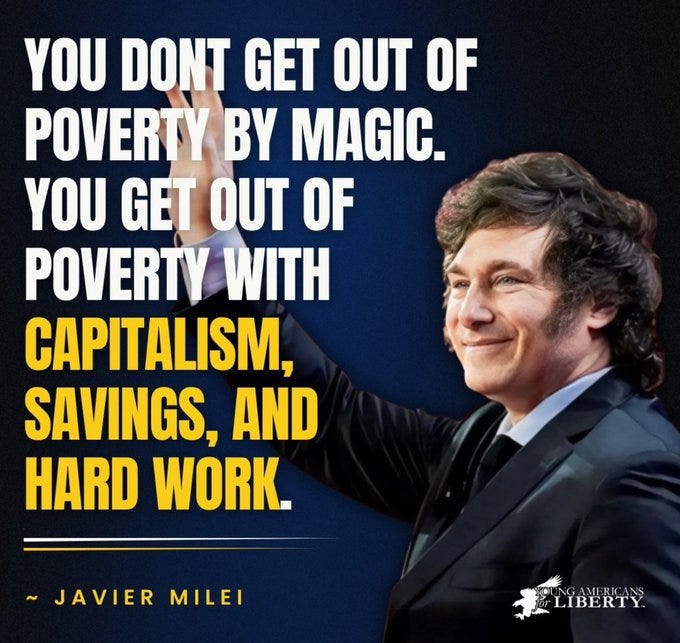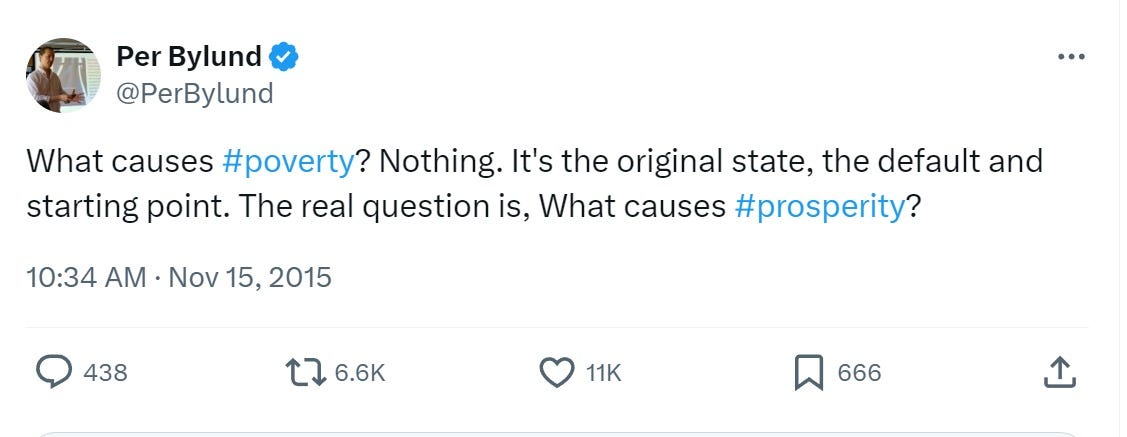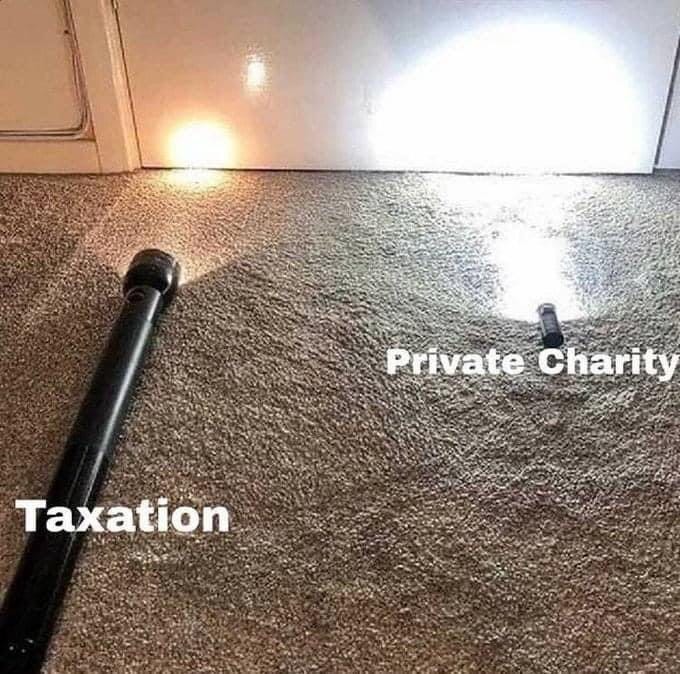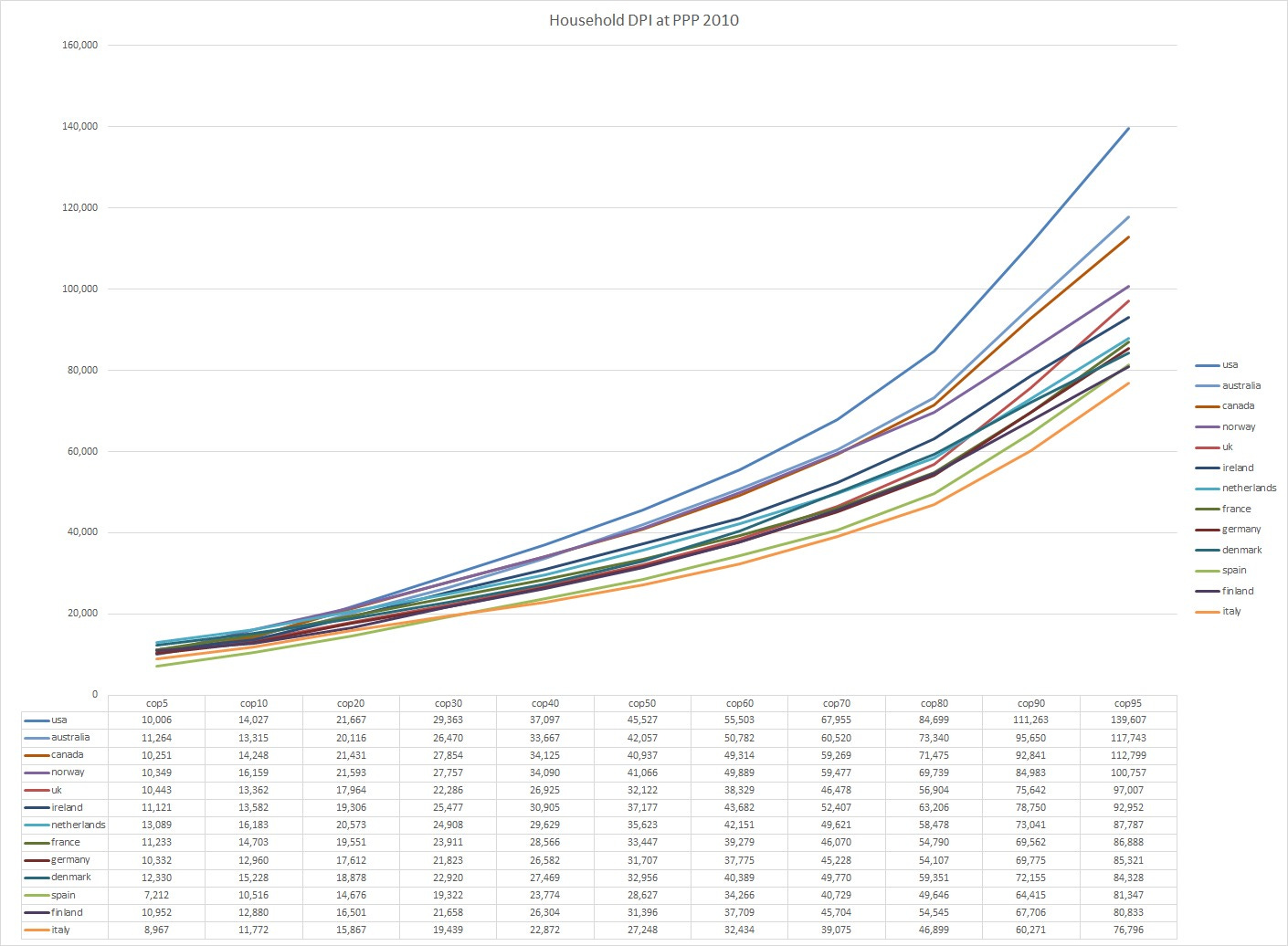causing prosperity
welfare states are not charity; they're poverty traps
we live in strange times, times when seemingly we have forgotten the obvious things and are suffering decline as our just desserts.
not long ago, this was “blatantly obvious civilizational bedrock about which the west broadly agreed.”
now it seems almost revolutionary.
and i suspect it’s because we’re asking the wrong questions.
this is the correct question.
“why are these people poor?” is a meaningless question. it’s the base state, nasty, brutish, and short.
ask instead: “how did some few people manage to escape the historical norm of the grinding deprivation of being hopelessly poor?” because poverty is not some sort of error, it’s the modal human outcome. like gravity, it must be overcome and lingers always seeking to pull you down.
there is a wonderful book on this entitled “the birth of plenty.” it’s an easy read, especially for a non-economist. it’s replete with interesting examples and analyses. honestly, it ought to be a universal high school curriculum. the world would be far better if it were.
it identifies 4 basic pillars upon which the emergence of plenty rests and provides examples of how removing even one can topple the structure entire. (note that neither “democracy” nor “central banking” are one of them.)
they are:
property rights
scientific rationalism/scientific method
modern capital markets and banking
effective and widespread transportation and communication
this is what you need for markets to thrive and to create wealth. i would argue that in order to really sustain point 1 and especially to sustain point 3, you need as a sort of predicate substrate a form of morality and civilizational expectation rooted in fair dealing, keeping your word, and doing unto others as you would have them do unto you. golden rules underpin golden ages.
and we tinker with this to our gravest peril, but tinker, deface, and demolish seems the order of the day for the decadent 3rd children of “shirtsleeves to shirtsleeves in 3 generations” as they squander what they were given because they have only ever known plenty and fail to understand that it is an achievement, a remarkable outcome of a finely wrought machine instead of the base state to which all are inevitably entitled. they see it as normal, not exceptional and thus seek to efface and eliminate exceptionalism itself as an idea.
and so luddite doctrine pervades and effect is mistaken for cause and the true sources of prosperity neglected and maligned.
labor may or may not be inherently noble, but it is not inherently productive. one man with a backhoe can out dig a platoon with shovels. people only have so many hours a day. it is ONLY by making them more productive that plenty may accrue. and vilifying those who push these envelopes is a path to penury.
you hear it all the time. “wages have not kept up with productivity!” but it’s not only inherently senseless that they should, but outright harmful to make them try. if you can dig a 10 foot trench by hand in a day or 1000 feet with a backhoe, who created your productivity? and that creating took investment into capital. and no one makes investment without return. and you want them to have that return because it encourages the investors to make your and everyone else’s labor even more productive.
let’s say you could keep all the value of the 10 foot trench you dug. is that really preferable to keeping, say, 30% of the value of digging 1000 feet? that’s still 300 trench feet of value, 30 times what you were getting before. you’re vastly wealthier for work that’s less arduous. so you get paid more AND products you buy get cheaper as measured in “hours of work to purchase.” everyone is winning.
wealth does not simply appear from the ground like water from a desert spring.
prosperity and plenty must be made and only occur when the conditions and incentives are conducive to such.
this is what makes these negative sum redistributionist games favored by gimmiecrat governments and their populist pandering so pernicious: they presume that plenty simply is and that if you have more than they that you must somehow be hogging it.
worse, they rile everyone up and say “this is unjust and you must pull down those who have stolen from you.” and this breaks the cycle of progress.
where once the dream from looking upon the big house on the hill was “one day that could be me” now stands the nastiness of “one day, i’m going to get that bastard.”
no one thrives in such a system. it becomes a race to cast awry and rend the foundations of the very success that allows such parasitical ideas to exist, feasting upon the fat of the land into which they are so determined to plow salt.
they grasp and they grab, they tax and they spend, they demolish markets and rights and eventually even science.
these people are the human embodiment of “sugar in the gas tank.”
they take from the creative and productive and give to those who produce less or even nothing. (and this is nowhere more true than in and around government “charity.”)
you cannot prosper by channeling resources from the most productive to the least. so wealth and plenty atrophy and potential goes unrealized.
look around the world. it's FAR better to be a 25th percentile member of a rich society than an 75th percentile member of a poor one.
would you rather be lower middle class in miami or upper middle class in haiti?
and yet we keep pushing the ideas that will prevent society from being richer.
reduce economic growth by even 1 percentage point per year and a century from now, your economy will be only ~1/3 the size it could have been.
reduce it by 2% and it would be less than 1/7th
these are massive, insurmountable gaps. to be 20% percentile in a society with median real income of $400k towers over being 50th or even 80th percentile in a society where it’s $57k. you’re probably twice as rich, maybe more and the kinds of things to which you will have access and your opportunities to innovate and for leisure and comfort and health are wildly different.
kidding aside, you can see this clearly in data like this (taken from NYT database of LIS data on disposable personal income (to account for tax burden) at purchasing power parity (PPP) to account for things like socialized healthcare and education and other such subsidy.
what’s glaringly apparent is that even in as imperfect an exemplar of free markets as the US, wealth soars relative to more redistributionist, higher tax peers. perhaps more telling is how little (if any) advantage even their poorest get. at even 5th and 10th percentiles the US is middle of pack and by the 20th, it has exceeded all. this redistribution does not lift up to poor, it just hurts the middle and the top.
at best, the price of adding ~$2k to the poor is taking ~$15k from the middle class.
that’s just bad math.
perhaps your society is “more equal” but it is not more prosperous.
now imagine where we might be if resources were left with the productive instead of funneled from them and to “the poor.”
there is essentially no argument of which i am aware that doing so would not result in a bigger economy and more wealth. it’s really just a question of “how big has the effect been?”
had the welfare state not been instituted in the 30’s and the redistributionist motives and mechanisms come to dominate in the US, where would we be? i think we can conservatively posit that between prolonging the depression and stealing the grease from the wheels of commerce and thereby making them run more slowly, we’ve shaved 1-2% a year off of growth. the interventionism of the last 20 years is likely considerably worse.
this would seem to imply that today’s economy could have been 3-7X the size it actually is. stop and think about what that means. 3-7 times.
in terms of per capita GDP, that’s the difference (at PPP) between the US and costa rica at the low end, and and the US and namibia on the high end. (SOURCE)
those are not locales one would mistake for one another.
median household income would not be $74k, it would be $222-$518k. even the 10th percentile would likely tower over today’s middle class in terms of their access to amenities, creature comforts, and technology.
who knows what advances in medicine, transit, and technology we might have had. flying cars and cures for cancer, virtual worlds and real prosperity. luxuries and necessities unimagined and otherwise inaccessible. not long ago, even the richest could die from a simple bacterial infection. now the poorest have access for pennies to antibiotics that kings would have paid king’s ransoms for in times gone by.
it would likely have outlandishly positive effects on the environment as well as societies treat “environment” like a luxury good (in the economist’s sense of a good with little demand among the poor, but disproportionately rising demand among the wealthy) (see full piece on this issue here: progress is environmentalism)
i do not mean to sound unsympathetic to the plight of the poor.
i’m actually seeking to be their advocate.
it’s just important to realize that trying to eliminate relative poverty actually increases absolute poverty which is, of course, the one that actually stunts and kills you.
if you want to “help the poor” help them do what they seek to do to help themselves:
to live in a prosperous economy.
there is a reason that even upper middle class people in poor societies make backbreaking and dangerous journeys for a chance to sneak into a rich country and to try to thrive there and it’s because being poor in a rich society is better than being middle class in a desperately poor one.
we cannot help the poor by undertaking the breakage of the engines of plenty. this hurts them more surely than any other course and they are least able to withstand it.
redistribution of wealth to help the poor represents the literal economic equivalent of peeing your pants to stay warm on a freezing winter night.
after the fist few seconds, you’ll really wish you had not done that.
this is not what thriving (or equity) looks like…










Surely another 'basic pillar upon which the emergence of plenty rests' is cheap energy
A cure for cancer would disrupt a very lucrative industry. I always struggle with this because I want to believe in the Atlas Shrugged story as I've seen so many ways in which it has grains of truth, but I just see predatory industry rolling over the planet for centuries. How do we address that? Have we ever had executives that embody the golden rule?